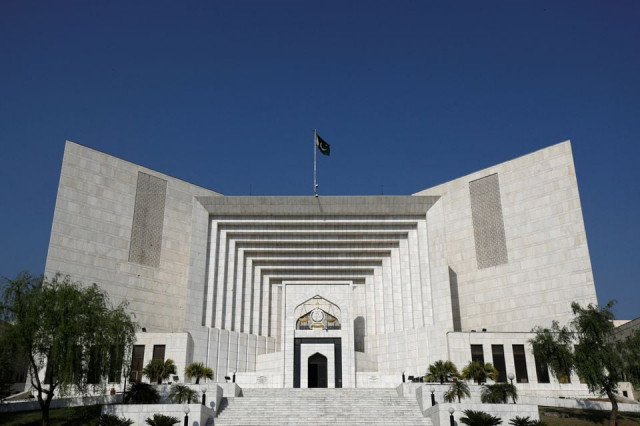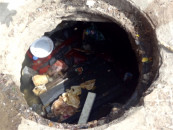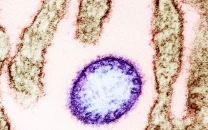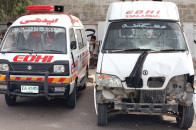SC opposes judicial oversight
Top court stresses necessity of civil society’s inclusion in disaster management, relief efforts

Abolishing the role of judges in Sindh flood relief distribution monitoring, the top court has noted that the role assigned to the judicial officers of overseeing work of the executive by heading citizens’ committees essentially meant officers were performing executive functions – an act that goes against the principle of separation of powers.
A 15-page judgement authored by Justice Ayesha Malik modified the Sindh High Court (SHC) judgment to the extent that the citizens’ committees shall no more be headed by a civil judge notified by a district judge.
It ruled the panels shall no longer work under the supervision of a district and session judge.
"The Constitution of the Islamic Republic of Pakistan, 1973 does not contemplate the assumption of functions by one organ that essentially belongs to another. Moreover, planning and strategy, coordination, monitoring and implementation are the functions of the executive and is best left for them to fulfil their duty and obligations in this regard,” the ruling read.
Furthermore, it added, the work of these committees was a full-time job which will require the judicial officers to spend time on these committees which, in turn, takes them away from their judicial work that is also neither practical nor expedient.
The issue before the apex court essentially was the exercise of jurisdiction by the high court while creating the citizens’ committees and placing judges from the district judiciary on these committees to oversee the work, being done by the committees.
The judgement, however, noted that the citizens' committees shall continue to operate with the given composition including that of vulnerable groups, particularly women for monitoring the relief work and providing necessary information to the DDMA to improve their efforts.
"Furthermore, the direction given in the impugned orders that the citizens committee shall look after the affairs of tent cities is modified in the manner that the citizens committees shall oversee the work of the government authorities and provide necessary information and data to facilitate the work of the authorities. In this regard, we clarify that the 'citizens’ committee itself shall not engage in directing or controlling the relief work being undertaken but shall participate in the process put in place by DDMA to make it more effective and inclusive,” it read.
"The requirement of filing reports before the high court by the PDMA and DDMA with respect to the work and progress of the relief work shall be filed bi-weekly to ensure efficiency. Further, the requirement of filing reports before this court with respect to the composition of the citizens’ committee shall be filed within three weeks to ensure necessary compliance,” it added.
The court also noted that as per the policy guidelines, women are at greater risk from natural disasters than men.
"They are vulnerable and victims in natural disasters but also play a significant role throughout the disaster management cycle, without being adequately recognised and included in the decision making. The policy guidelines also emphasise on ensuring equal access to relief opportunities for victims without any discrimination which requires the needs of vulnerable groups to be targeted to ensure that their needs are attended to, safeguarded and protected,” the judgement stated.
"As per the policy guidelines, women, children, older persons, persons with disabilities are all defined as vulnerable groups in disaster. The NDMA and National Disaster Risk Reduction Policy all emphasise on reducing risks and vulnerabilities of those who are marginalised which include women, children, older persons, persons with disabilities and minorities, however, there is no report available on the actual efforts made during the last six months,” it added.
“National Gender and Child cell framework was also formulated in 2013 to work towards disaster preparedness and disaster risk reduction for which again there is no information on its working in the 2022 floods.”
Therefore, it continued, in line with the policies formulated, it was imperative that the citizens’ committees include women, older persons and persons with disabilities so that the required response is ensured and provided and that the policy guidelines formulated be implemented in real-time.
“In this context, we note that the affected areas require maternity and healthcare for women so there is an increased need for female doctors, trainers and caretakers to attend to the health concerns. Women are often subjected to gender-based violence and harassment in times of such calamities, therefore safety and security concerns are also of significance for which appropriate response is also required. In this context, although the framework exists, an effort must go into ensuring that it actually functions and fulfils its mandate.”
Accordingly, we find that the citizens’ committee should ensure the representation of vulnerable groups, particularly women, in order to strengthen its perspective, the judgement stated.
The court noted that these are unprecedented times because as per the United Nations Office for the Coordination of Humanitarian Affairs, more than 33 million people have been affected by the floods of which 14.5 million are in Sindh alone (ECHO Daily Flash of 25 October 2022 – Pakistan).
Furthermore, despite the fact that the act has provided its framework since 2010, the efficiency and effectiveness of the PDMA and DDMA are questioned by affectees, it noted.
"There is merit in this argument as there appears to be no monitoring system in place. In this context, participation by the public in the PDMA and DDMA and even at the commission level ensures that the affectees are able to bring first-hand their vulnerabilities and priorities, which results in a more measured response and proper allocation of resources where required. It also gives the authority greater insight into the affected communities enabling them to work more effectively and produce better results,” it stated.
"Community participation is not only necessary for planning disaster management but also for implementing and monitoring purposes as it gives people the right to participate in the decisions that affect their lives. This creates more awareness and a sense of ownership and responsibility which is required, particularly in disaster management so to enhance effectiveness and engage the people with their communities to provide rescue, relief and rehabilitation efforts. Hence, citizens’ participation in the PDMA and DDMA can improve coordination and response which will enable the government authorities to provide relief work in a more effective and efficient manner,” the court stated.
It added that moving forward, it is fundamental to the composition of the commission, the NDMA, the PDMA and the DDMA that members of civil society are included in it.
"At present to deal with the issue at hand, the citizens’ committees can work with DDMA to the extent of monitoring, coordination efforts and ensuring that relief work reaches the affectees, who do not have sufficient assistance at the moment,” it stated.
"The committees can also facilitate the PDMA and the DDMA of Sindh in providing necessary information and data with reference to relief work and what is required which will improve the Authorities’ coordination with affected areas and communication with affected areas especially due to the challenges of accessibility and communication failure,” it added.
"The citizens’ committee can, therefore, monitor the efforts of the PDMA and the DDMA which will not only lead to better results,” it further stated.
The court found that the formation of the citizens’ committees by the high court, in principle, was to facilitate relief efforts in different areas within Sindh, however, the inclusion of the members of the district judiciary was not required given that there is an entire legal framework under the act to ensure relief work right down to the district level.
“As per the scheme of the act, members of the civil community which include volunteers, NGOs, doctors and others can be made part of the Provincial and District Management Authorities to help relief efforts. The record shows that they have been included in the DDMA vide notification dated 24.06.2014, however, there is no information on whether they actually participated. Section 3(2)(p) of the act provides that National Commission shall also consist of representatives of civil society or any person appointed by the prime minister,” the judgement stated.
"As this is the policy-making body, the inclusion of members of civil society on this commission is imperative because for effective and efficient disaster management the inclusion of people likely to be affected is necessary not only for coordination, data collection and creating awareness but also to combine the efforts of the community and the authority in the event of a natural disaster. This gives civil society an opportunity to become part of the implementation, coordination and monitoring plan which only makes the work of the authority more effective,” it added.
The judgement noted that the act also provides under Section 8 that the NDMA shall consist of members as may be prescribed by its chairperson. This authority is headed by the prime minister, who can include any member as he deems appropriate.
Similarly, at the provincial as well as the district level, the act provides in its Sections 13 and 15 that members to the PDMA and DDMA may be nominated by the chief minister and by the district authority to include any member as they deem appropriate.
“Under these provisions, members of civil society can be included not only on the commission but also in the authorities to ensure that relief work is carried out where required and to help in mitigating the effects of the natural disaster as well as work on the rehabilitation of the affectees. Hence, the inclusion of civil society is necessary,” it asserted.
The court noted that the orders have directed that the citizens’ committees should comprise medical superintendents of the Taluka Hospital, Mukhtiarkar, the focal person of PDMA and the president of the Taluka Bar Association.
“In this context, we find that the policy guidelines require the participation of women in disaster management plan at all levels to ensure the integration of the gender perspective,” it stated.



















COMMENTS
Comments are moderated and generally will be posted if they are on-topic and not abusive.
For more information, please see our Comments FAQ